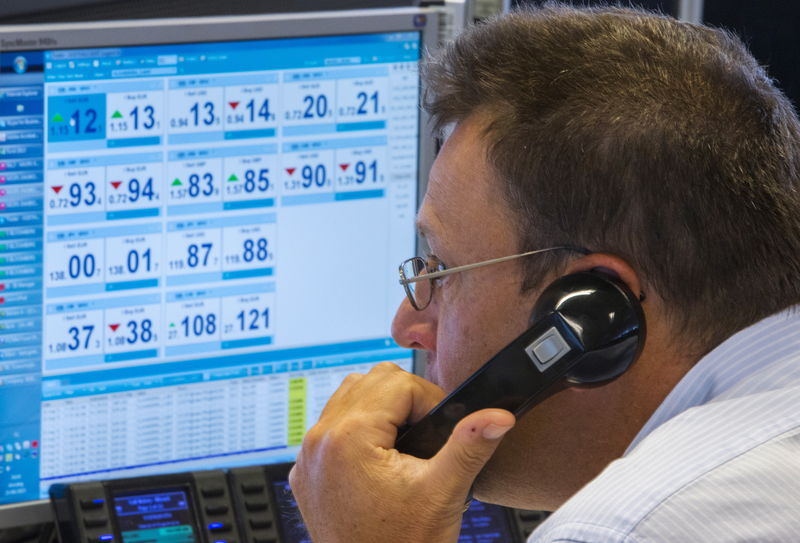By Lionel Laurent
LONDON (Reuters) - Stock markets are rebounding after a bruising 48-hour sell-off. But with China still battling to revive its slowing economy, Europe's "screaming buys" come with risks.
There is no doubt the recent correction has created opportunities. Even taking into account the 4.5 percent jump in the STOXX Europe 600 index (STOXX) on Tuesday, European stocks are still down 14 percent from this year's peaks and trade at a discount to the U.S. S&P 500 (SPX) and Japanese Nikkei (N225).
But while the U.S. had its "Apple (O:AAPL) at $99" opportunity during the worst of Monday's rout, when the world's biggest company hit its lowest level in almost a year, finding a safe haven in big European names like Nestle (VX:NESN) or Unilever (L:ULVR) (AS:UNc) is proving trickier.
For a start, the engine of growth for these global companies in recent years has been emerging markets - precisely where economic growth is faltering and triggering market fears of fresh deflationary pressures.
Six European sectors, including food and beverages, autos and chemicals, derive more than 15 percent of their revenue from the Asia-Pacific region and have delivered the worst relative total returns since Aug. 5, according to Citi research.
Fund managers and strategists said the better buys were stocks and industries more exposed to a domestic recovery.
"Some of the consumer staples considered to be defensive have quite significant exposure to China ... They aren't necessarily a sanctuary," said Rory Powe, manager of the Man GLG Continental Europe fund, which has 174 million pounds ($275 million) under management.
Powe said a company such as Fielmann (DE:FIEG), a German spectacles maker with a market value of 4.6 billion euros ($5.27 billion), was an example of a better bet in the long run.
Valuation is another issue. Many of Europe's blue chips on the STOXX Europe 50 index (STOXX50) trade at a premium to the broader market, including oil company Total (PA:TOTF), consumer-goods maker Unilever (L:ULVR), British American Tobacco (L:BATS) and brewer Anheuser-Busch Inbev (BR:ABI).
Credit Suisse (SIX:CSGN) strategists recommended clients buy telecom stocks for dividends and cash flow and also backed employment agency Adecco (VX:ADEN), Southern European banks like Intesa Sanpaolo (MI:ISP) and Germany's SAP (DE:SAPG). They warned against consumer staples' valuation and emerging-market focus.
While top blue chips are no slouch in terms of dividend yield - the STOXX Europe 50 yields around 4.3 percent - Goldman Sachs (NYSE:GS) strategists warned they came with risks.
"(There is) the possibility that investors will hide in the perceived safety of defensive "bond proxies" and consumer staples in particular ... it should be stressed that many of the companies in these sectors have high emerging-markets exposure and are seeing a slowdown in earnings (growth)," they said.
FALLING KNIFE
Among the beneficiaries of the rebound on Tuesday, driven by China's cut in benchmark interest rates, were bombed-out sectors like mining and commodities that have been battered by worries over slowing Chinese demand. Glencore (L:GLEN) was up 4 percent and Antofagasta (L:ANTO) rose 6.8 percent.
Some investors warned that trying to buy beaten-up commodities stocks was like catching a falling knife, though.
"We remain bearish in oil and metals ... These sectors, although now looking very cheap, may get cheaper still," said Lorne Baring, Managing Director of B Capital.
Despite the risks involved in picking up bargains, some fund managers pointed out that economic signals coming from developed economies suggested demand was broadly healthy - even if the global growth outlook looked bruised.
"There are solid reasons to be worried about the global growth outlook given emerging markets and systemic fears in China," said Valentijn van Nieuwenhuijzen, head of multi-asset strategy at NN Investment Partners.
"However, it is a risk – not yet a reality – that this will spread to the developed world."
For now, the opportunities should be taken with a pinch of salt.
"Some of these sectors are oversold and extremely unloved ... But we just have to be careful of the knock-on effects," said Man GLG's Powe.
($1 = 0.6338 pounds)

($1 = 0.8724 euros)